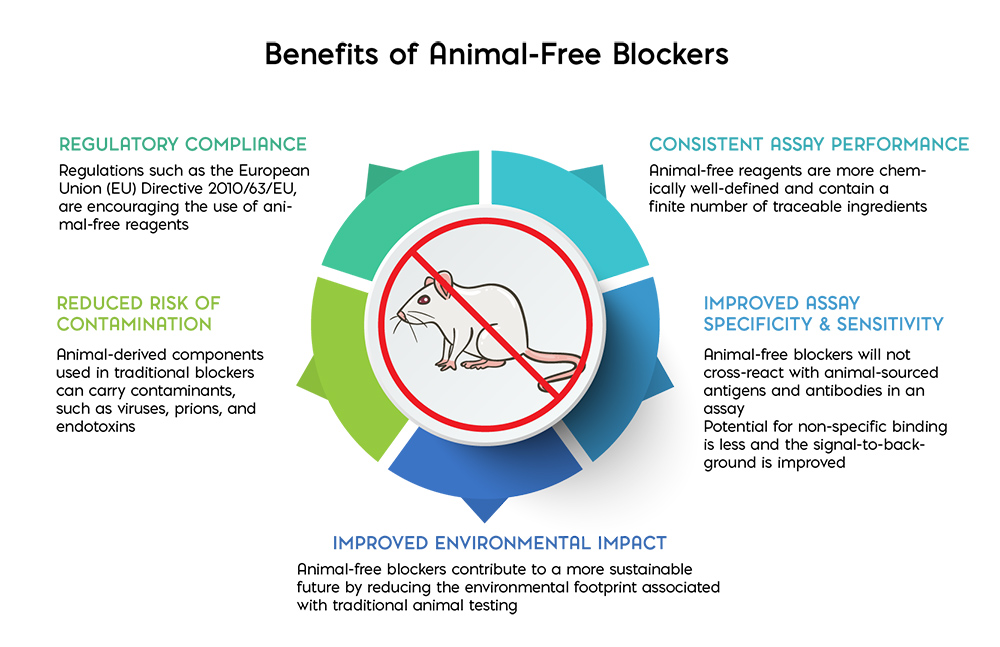In recent years, there has been a growing movement towards developing animal-free reagents that aim to improve assay performance and reproducibility while also contributing to a more sustainable and humane future. This shift reflects the broader commitment to ethical practices and innovation within the science community, with an aim to replace animal-derived reagents commonly used in laboratories with animal-free versions that are more scientifically robust.
 Immunoassay blockers, such as Mouse IgG, are used in immunoassays to reduce non-specific binding and other interference that can lead to false positive results. These reagents can be used in large amounts and require mice to be immunized in order to harvest the antibodies they produce.
Immunoassay blockers, such as Mouse IgG, are used in immunoassays to reduce non-specific binding and other interference that can lead to false positive results. These reagents can be used in large amounts and require mice to be immunized in order to harvest the antibodies they produce.
The process has raised ethical concerns and prompted the exploration of alternative, animal-free methods for immunoassay blocker production.
The COVID-19 pandemic highlighted the vulnerability of Mouse IgG supply chains to unforeseen events and the dependence on single-source suppliers, particularly those located in China. Recombinant reagents play a critical role in diversifying and de-risking supply chains by offering greater flexibility, reliability, and scalability compared to traditional manufacturing methods. Importantly, recombinant production processes can be tailored to meet specific demand requirements, enabling manufacturers to adjust production volumes more rapidly in response to market dynamics.
In addition to the ethical considerations, using animal-free blockers has several other benefits that make them ideal, sustainable alternatives over traditional animal-derived blockers.
Top 5 Advantages of Animal-Free Blockers in Immunoassays
- Enhanced Assay Specificity and Sensitivity
Animal-free blockers can improve assay specificity as they eliminate the potential for cross-reactivity or interference with animal-derived components within an assay. Moreover, animal-free blockers minimize the risk of nonspecific binding, enabling a higher signal-to-noise ratio, and better assay sensitivity. For assays detecting low-abundance analytes, this heightened sensitivity is particularly valuable. - Consistent Assay Performance
In addition to increasing assay specificity and sensitivity, animal-free blockers can improve assay reproducibility. Animal-derived reagents often suffer from batch-to-batch variability, whereas animal-free reagents are more chemically well-defined and contain a finite number of traceable ingredients that demonstrate greater consistency. This traceability and consistency also support regulatory advantages that can improve an assay’s speed to market. - Ethical Considerations & Improved Environmental Impact
There is growing societal awareness and expectations regarding cruelty-free and humane practices which are creating a shift towards ethical consumerism. Companies and individuals are increasingly seeking products and services aligned with their values. Animal-free blockers provide an opportunity for companies to actively participate in ethical innovation and showcase their dedication to advancing science and technology while contributing to a. more sustainable future. - Regulatory compliance
As the ethical landscape evolves, regulatory bodies are becoming more stringent about the use of animals in science. Embracing animal-free blockers aligns with more sustainable practices and also ensures compliance with changing regulations. Proactively addressing sustainability can help companies enhance their reputation in the eyes of consumers and regulatory authorities. - Reduced risk of contamination
Animal-derived components used in traditional blockers can carry contaminants, such as viruses, prions, and endotoxins, that can affect the accuracy of an assay. Animal-free reagents do not carry any of these risks.

The innovation and adoption of animal-free blockers represent a pivotal step towards ethical and sustainable practices in diagnostic manufacturing. Beyond the immediate benefits of improved assay performance and regulatory compliance, companies choosing this path position themselves as leaders in responsible business practices.
Meridian recently launched two new immunoassay interference blockers, K-Block™ and Mouse-Free IgG, which are 100% animal-free and have equivalent or superior performance compared to traditional animal-derived blockers. These products align with Meridian’s strategy to pioneer sustainable and innovative raw materials for diagnostic assay manufacturers. Meridian hopes to encourage diagnostic manufacturers to adopt animal-free products, such as K-Block™ and Mouse-Free IgG, and actively contribute towards improving our community’s environmental footprint and supporting a more sustainable future. Meridian continues to lead the way in promoting environmental responsibility within the industry.
To learn more about K-Block™ and Mouse-Free IgG, join our webinar, March 20th at 9 am PT.
All registrants will receive a copy of the webinar recording.